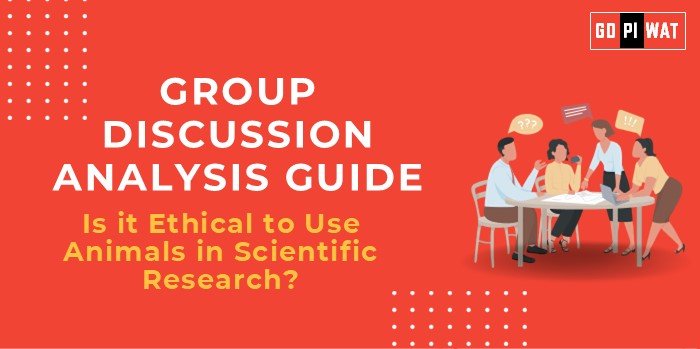📋 Group Discussion Analysis Guide: Is it Ethical to Use Animals in Scientific Research?
🌐 Introduction to the Topic
Opening Context: “Scientific research has significantly advanced human and animal health, yet the ethical dilemmas surrounding the use of animals for experiments continue to spark heated debates worldwide.”
Topic Background: The practice of using animals in research dates back centuries, playing a pivotal role in medical breakthroughs like vaccines and organ transplants. While some argue it’s a necessary evil for scientific progress, others advocate for cruelty-free alternatives and question the moral right to exploit animals for human benefits.
📊 Quick Facts and Key Statistics
- 🐾 Animal Testing for Research: Over 115 million animals are used globally for experiments annually (Humane Society International).
- ⚖️ Regulation Gap: Only 40 countries have adequate animal research regulations, leaving room for ethical concerns.
- ❌ Scientific Failures: About 90% of drugs tested successfully on animals fail in human clinical trials (National Center for Biotechnology Information).
- 💡 Alternative Techniques: Investment in non-animal methods like organ-on-a-chip grew by 25% from 2020 to 2023, signaling a shift towards humane research.
👥 Stakeholders and Their Roles
- 🏛️ Governments: Enact and enforce animal welfare regulations and fund alternative research technologies.
- 🔬 Scientific Community: Drives innovation while advocating for ethical practices.
- 🐕 Animal Welfare Organizations: Campaign for stricter laws and cruelty-free alternatives.
- 🏢 Pharmaceutical and Cosmetic Industries: Major contributors to animal testing, though increasingly exploring alternatives.
🏆 Achievements and Challenges
✨ Achievements:
- 💉 Medical Advancements: Contributions to vaccines for polio and COVID-19.
- 📜 Policy Progress: EU’s ban on animal testing for cosmetics is a global benchmark.
- 🔬 Alternative Technologies: Success in AI modeling and lab-grown human tissues as replacements.
⚠️ Challenges:
- 🤔 Ethical Dilemmas: Balancing scientific needs with animal welfare rights.
- 🌍 Inconsistent Regulation: Lack of global standardization in animal research ethics.
- 🧪 Limited Alternatives: Current cruelty-free methods do not fully replicate complex human biology.
📚 Case Study:
- 🇬🇧 UK’s Reduction of Animal Testing Act: Mandates replacing and reducing animal use through innovative alternatives.
💬 Structured Arguments for Discussion
- ✔️ Supporting Stance: “Animal research is vital for medical progress, evidenced by its role in eradicating diseases like smallpox.”
- ❌ Opposing Stance: “With 90% of animal-tested drugs failing in humans, the practice is scientifically flawed and ethically unjustifiable.”
- ⚖️ Balanced Perspective: “While animal testing has driven scientific achievements, the growing potential of alternatives warrants a reevaluation.”
🛠️ Effective Discussion Approaches
- 🎯 Opening Approaches:
- 📊 Contrast: “Every year, millions of animals endure experiments for science, yet 90% of these tests fail in human trials—how do we balance ethics and efficacy?”
- 📜 Historical Perspective: “The polio vaccine owes its existence to animal research, but do such successes justify continued animal suffering?”
- 🔄 Counter-Argument Handling:
- Acknowledge ethical concerns with data on successful alternatives.
- Counter economic objections by highlighting cost reductions via AI-based models.
🔍 Strategic Analysis of Strengths and Weaknesses
- 💪 Strengths: Accelerates medical breakthroughs, creates jobs in research sectors.
- ⚡ Weaknesses: Ethical criticisms, high failure rates in human trials.
- 🌟 Opportunities: Innovations in technology, global policy alignment.
- ⚔️ Threats: Public backlash, inconsistent regulations.
📚 Connecting with B-School Applications
- 🌍 Real-World Applications: Link to discussions on CSR in pharmaceuticals or policy-making.
- ❓ Sample Interview Questions:
- “How would you approach balancing profitability and ethics in animal research industries?”
- “Discuss the role of government in promoting cruelty-free research.”
- 💡 Insights for B-School Students:
- Explore intersectional applications in healthcare management.
- Investigate entrepreneurial opportunities in cruelty-free tech solutions.


